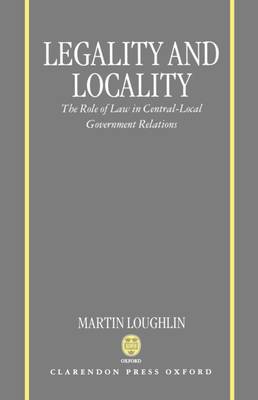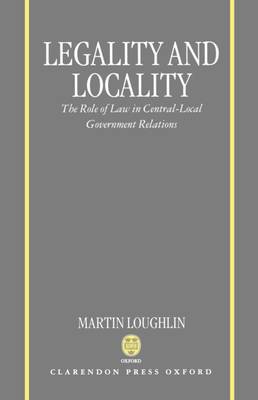
En raison d'une grêve chez bpost, votre commande pourrait être retardée. Vous avez besoin d’un livre rapidement ? Nos magasins vous accueillent à bras ouverts !
- Retrait gratuit dans votre magasin Club
- 7.000.000 titres dans notre catalogue
- Payer en toute sécurité
- Toujours un magasin près de chez vous
En raison de la grêve chez bpost, votre commande pourrait être retardée. Vous avez besoin d’un livre rapidement ? Nos magasins vous accueillent à bras ouverts !
- Retrait gratuit dans votre magasin Club
- 7.000.0000 titres dans notre catalogue
- Payer en toute sécurité
- Toujours un magasin près de chez vous
Legality and Locality
The Role of Law in Central-Local Government Relations
Martin Loughlin
Livre relié | Anglais
147,95 €
+ 295 points
Description
This book seeks to trace the main dimensions of recent conflicts between central departments of governments and local authorities and to reveal something of their significance. It does so by focusing on the role of law in shaping the central-local government relations which is neglected in many contemporary studies and yet is of vital importance in identifying the character of that relationship. Precisely why they should be so is not self-evident. The main objective of this introduction therefore is to highlight the importance of this dimension to the study of central-local relations and then to explain the way in which the key themes of the study are to be addressed. One highly significant aspect of the study is the identification of a process of juridfication which is only gradually becoming clear. This has not only been a major undertaking, it has also been a highly complex, ambiguous, confusing, and frustrating activity. This has caused problems for government and for the judiciary and not surprisingly there have been expressions of discomfort on all sides. This book helps to explain where the process may have gone wrong and why ultimately it may be an objective which cannot be realised. Ultimately what the book seeks to demonstrate is that the issues raised by the government of central-local relations transcend the institution of local government and are directly linked to our system of parliamentary democracy. Furthermore the author argues that the system of central-local government relations has evolved in such a way that it reveals a great deal about our tradition of public law. An examination of these issues through an explication of the themes of legality and locality therefore requires the reader to address basic questions about the nature of contemporary British government.
Spécifications
Parties prenantes
- Auteur(s) :
- Editeur:
Contenu
- Nombre de pages :
- 464
- Langue:
- Anglais
Caractéristiques
- EAN:
- 9780198260158
- Date de parution :
- 31-10-96
- Format:
- Livre relié
- Format numérique:
- Genaaid
- Dimensions :
- 162 mm x 243 mm
- Poids :
- 848 g

Les avis
Nous publions uniquement les avis qui respectent les conditions requises. Consultez nos conditions pour les avis.






